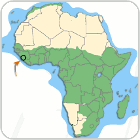Plant breeding programs in Sierra Leone
Located in the south-western part of West Africa, Sierra Leone has a tropical climate. Agriculture is the primary occupation in Sierra Leone, employing 2/3 of the labour force. Rice, grown by 80% of farmers, is the most important subsistence crop. Millet and coffee are also important in the Sierra Leone agricultural economy.
Rice, grown by 80% of farmers, is the most important subsistence crop. Millet and coffee are also important in the Sierra Leone agricultural economy.
The agricultural research development of Sierra Leone has been limited by a decade-long rebel war. Still today, the government is more focused on the reconstruction and rehabilitation of infrastructure rather than the support of plant breeding programmes. Most of the relevant courses in the field of plant breeding and biotechnology have been taught in two universities (Fourah Bay College and Njala University College (NUC)).
Sierra Leone has two public agricultural research institutions, with funding mainly from the government. Although the total research budgets in both institutions are relatively low, the allocations for plant breeding ranges from 58 to 80%. Line development and evaluation are the main activities of plant breeding programmes and include mainly rice, millet, sorghum, vegetables and sweet potato.
The two research institutes mainly use conventional methods for their crop improvement activities for the past decades. There is an urgent need for researchers to be exposed to modern biotechnological tools. Inadequate knowledge about participatory plant breeding techniques is considered to be one of the most important factors limiting success of plant breeding programmes in Sierra Leone.
Research and education institutes with activities in plant breeding
_______________________________________
Information by Moses T. Moseray (2005). Information based on the Sierra Leone's full report from the PBBC survey. Last revised 18-06-2010, GIPB.

